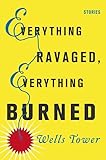 I was first alerted to Wells Tower’s existence in 2004 when a reader emailed asking what I knew about him. The answer was “nothing,” but I did a little digging and found some impressive long-form journalism, primarily in Washington Post Magazine and a growing reputation as a short fiction writer centering mainly on his Pushcart prizewinning story “Everything Ravaged, Everything Burned.” We actually had a nice collection of Wells Tower links in the comments of that old post, but they were lost in the great Millions comment purge of 2006.
I was first alerted to Wells Tower’s existence in 2004 when a reader emailed asking what I knew about him. The answer was “nothing,” but I did a little digging and found some impressive long-form journalism, primarily in Washington Post Magazine and a growing reputation as a short fiction writer centering mainly on his Pushcart prizewinning story “Everything Ravaged, Everything Burned.” We actually had a nice collection of Wells Tower links in the comments of that old post, but they were lost in the great Millions comment purge of 2006.
In any case, in the ensuing five years, Tower has penned some of the decade’s most memorable pieces of immersion journalism, most notably “Bird-dogging the Bush vote: Undercover with Florida’s Republican shock troops” (sub. required) in Harpers, and his first collection of fiction has come out, anchored by the story that first got him noticed.
About that title story: “EREB” is a workplace drama in the guise of a viking adventure tale.
You could say that those people on Lindsfarne were fools, living out there on a tiny island without high cliffs or decent natural defenses, and so close to us and also the Swedes and the Norwegians, how we saw it, we couldn’t afford not to come by and sack every now and again.
Though it wasn’t my favorite story in the collection, it’s not hard to see why people started wondering who Wells Tower was. Also impressively ambitious is “Leopard.” As I noted in my New Yorker fiction round up, “This one is told in the second person about (by?) an unpopular eleven-year-old boy. Tower gets into the boy’s head incredibly well – the perpetually wounded pride, the outlandish fantasies that punish those who have wronged him.”
The other seven stories are somewhat more conventional – lots of wayward men, cheated on, cheating, put upon, falling apart – though no less entertaining. Their hangovers are “calamitous.” They spy on the hooker that lives across the street. Opening the collection, “The Brown Coast” begins “Bob Monroe woke up on his face. His jaw hurt and morning birds were yelling and there was real discomfort in his underpants.”
But these fallen creatures aren’t meant to disgust or inspire pity. The prose is too raucous and the set pieces too inventive. And when they’re not about vikings or imaginary leopards, Tower’s stories may be the short fiction we’re used to, but delivered with the volume turned up.
Bonus Link: Wells Tower’s Year in Reading









